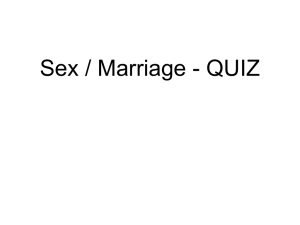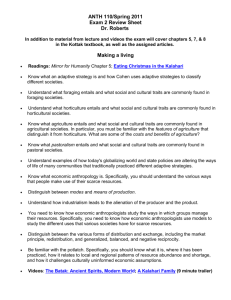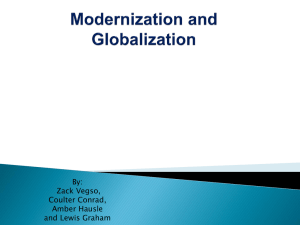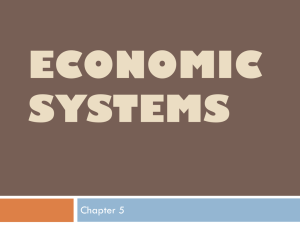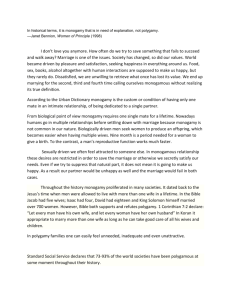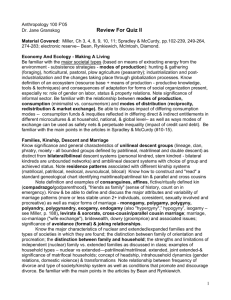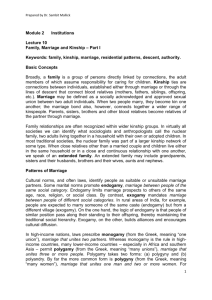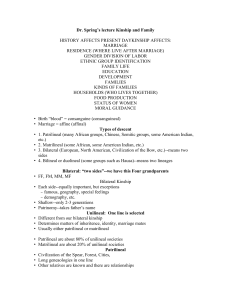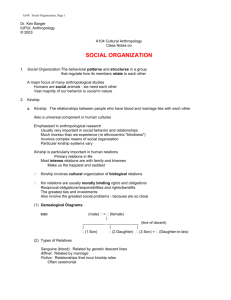9th Grade English Exam: Family & Relationships
advertisement
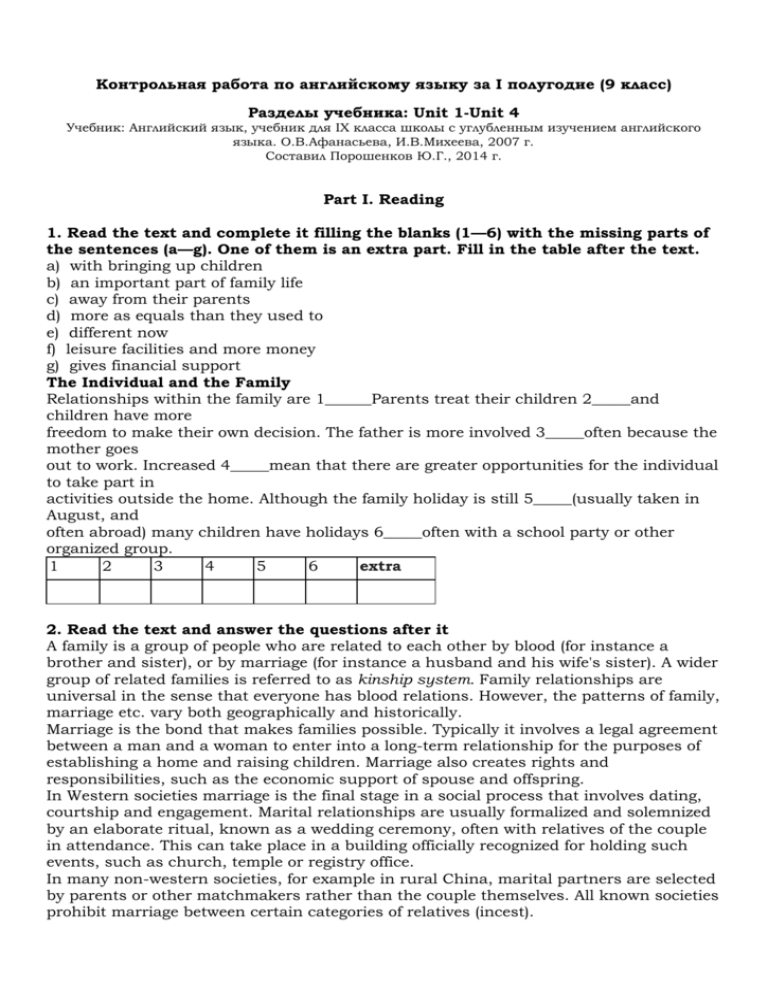
Контрольная работа по английскому языку за I полугодие (9 класс) Разделы учебника: Unit 1-Unit 4 Учебник: Английский язык, учебник для IX класса школы с углубленным изучением английского языка. О.В.Афанасьева, И.В.Михеева, 2007 г. Составил Порошенков Ю.Г., 2014 г. Part I. Reading 1. Read the text and complete it filling the blanks (1—6) with the missing parts of the sentences (a—g). One of them is an extra part. Fill in the table after the text. a) with bringing up children b) an important part of family life c) away from their parents d) more as equals than they used to e) different now f) leisure facilities and more money g) gives financial support The Individual and the Family Relationships within the family are 1______Parents treat their children 2_____and children have more freedom to make their own decision. The father is more involved 3_____often because the mother goes out to work. Increased 4_____mean that there are greater opportunities for the individual to take part in activities outside the home. Although the family holiday is still 5_____(usually taken in August, and often abroad) many children have holidays 6_____often with a school party or other organized group. 1 2 3 4 5 6 extra 2. Read the text and answer the questions after it A family is a group of people who are related to each other by blood (for instance a brother and sister), or by marriage (for instance a husband and his wife's sister). A wider group of related families is referred to as kinship system. Family relationships are universal in the sense that everyone has blood relations. However, the patterns of family, marriage etc. vary both geographically and historically. Marriage is the bond that makes families possible. Typically it involves a legal agreement between a man and a woman to enter into a long-term relationship for the purposes of establishing a home and raising children. Marriage also creates rights and responsibilities, such as the economic support of spouse and offspring. In Western societies marriage is the final stage in a social process that involves dating, courtship and engagement. Marital relationships are usually formalized and solemnized by an elaborate ritual, known as a wedding ceremony, often with relatives of the couple in attendance. This can take place in a building officially recognized for holding such events, such as church, temple or registry office. In many non-western societies, for example in rural China, marital partners are selected by parents or other matchmakers rather than the couple themselves. All known societies prohibit marriage between certain categories of relatives (incest). Rules concerning the number of husbands or wives a person is allowed at one time vary between societies. Basically, there are two types of marriage: monogamy, where the individual has only one spouse at a time; and polygamy, where two or more spouses are recognized socially. Polygamy is particularly widespread in Islamic areas of Africa, where Muslim men are allowed to have up to four wives. Monogamy is characteristic of Western societies. Divorce rates vary considerably in different societies. There are also many other ways of ending a marriage, including desertion, separation and annulment (legal cancellation). Consequently, divorce rates are imperfect measures of marital breakdown. A person who marries leaves the family of origin to set up his or her own family of procreation. In the process he or she simultaneously becomes a member of a kinship system consisting of three families: the family of origin, the spouse's family of origin and the new family of procreation. A family comprising three generations living together, namely parents, children and grandparents is known as an extended family. For most people the need for social and geographical mobility makes it impractical to share a household with a large number of relatives throughout their lives. Consequently, the typical family form in contemporary western societies is not the isolated nuclear or extended type, but the modified extended family. This type of family is characterized by a nuclear family household that maintains social economic and emotional ties with wider kin. Moreover it is a family form that seems to be spreading with industrialization and urbanization. Questions: I What is a family?_________________________ 2. How can you explain the term kinship system? 3. In what way do the family patterns vary?_ 4. What kind of family used to be a typical family in Western societies at the beginning of the 20th century?_______________________________________________________________________ 5. How has the family pattern changed since then?______________________________________ 6. What stages does a usual process of getting married involve?_ 7. Who selects marital partners in modern societies?_ 8. What is understood by monogamy and polygamy marriages? 9. How can people end their marriage? 10. How can you explain the terms the family of origin and the family of procreation? 1 l. What is the most typical family form nowadays in Western societies? In Islamic countries or religions? 3. Find in the text (Ex. 2) the words and phrases which mean the following: 1) a husband or wife_____________________________________________________ 2) someone's child or children_____________________________________________ 3) to take care of children while they are growing up____________________________ 4) the period of time when a man and a woman have a romantic relationship__________ 5) a formal agreement to get married________ 6) a ceremony in which two people get married_________ 7) relating to marriage_________ 8) a place in the UK where births, deaths, and marriages are officially registered and where you can marry without a religious ceremony_______________________________ 4. Read the mixed up parts of the text and put them in the logical order to get a complete story. A Self-made Man a) Charles, the son of a steel worker in Manchester, left school at sixteen. After working for several years in an advertising office, he discovered he had a gift for salesmanship. He was taken on by a firm making a rather poor quality soap powder, and went from door to door persuading people it was just what they needed. b) When he was forty-five Charles bought up a chain of supermarkets in the south, and moved to the south with his family. He bought a house in a pleasant area not far from London and found himself a neighbour of Charles and Anne Blankeney. Being hospitable and friendly, he at once made friends with them. c) With the money he saved he bought a small shop in a busy street, painted it and stocked it with sweets. He had noticed that there were a lot of children in the neighbourhood, but no sweet shops. He was tough, ambitious and never afraid of saying what he thought. After a few years, the sweet shop grew into a food store. Ten years later there were a lot of his stores all over the north. d) Charles is glad to have Henry and Anne as neighbours because he recognizes in Henry a businessman who, like himself, believes that everyone has the right to get rich, and the more money a man cams the more Charles respects him. He has no patience with some of today's young people who "expect lo be fed with a spoon and are afraid of a bit of honest work and sweat." I laving made his own way in the world, he is a strong believer in free enterprise. a)________ b)_______ c)_______ d)_______ Part II. Lexical and Grammar Tasks 5 Open the brackets to complete the text. Open the brackets to complete the text. Use active or passive forms of the verbs. Fill in the table after the text. Alternative to the Family The problems and pressures of modern Western society put a great strain on family life. Parents (expect)1 to provide love and discipline as well as the basic care, support, and training, and sometimes there is conflict and emotional stress within a family. Some people (believe)2 that the strain is too great and that alternative ways of raising children should (find)3 outside the traditional family. In Russia after the revolution, (he government (attempt)4 (abolish)5 the family. This move generally (regard)6 as a failure. One reason was that people (use)7 to doing things in a particular way, whatever the shortcomings. In addition, no adequate alternative forms of child care (provide)8 by the government. Similar attempts (create)9 a family-less society (make)10 by the pioneer fanners of the Kibbutz in what is now the Jewish state of Israel. Now they (consider)11 a failure too. The children of the pioneers, when they (grow)12 up. (begin)13 to want (spend)14 time with their children. Thus the family (reappear)15. In the West some people (found)16 communes. They are large groups of adults whose members live together with their children. The tasks of child care (share)17 by the adults. But these experiments also mostly (fail)18, basically because there is no real reason for the people to live together. 1 2 3 4 5 6 7 8 9 10 11 12 13 14 15 16 17 18 6. Complete the sentences using the countable and uncountable nouns from the box. Put the words in the right form and use the proper article. hair, light, noise, paper, room, time, coffee, tea, lemonade, orange juice, work, glass, youth 1. There are two__________________ in my coffee! 2. Close the curtain. There's too much_______________ for us to use the projector! 3. It's difficult to work when there is_________________ everywhere. 4. Have you got_____________ to read? 5. Is there _________ for me in the car to squeeze in? 6. We had great_____ at the party last night. 7. We'd like _____, two___________ and _________ please. 8. Macbeth is ____ by W. Shakespeare, the most prominent English playwright. 9. The door was made of green transparent_______. 10. He was_____________ polite, good-looking_______. 7. In which cases is the definite article used? 1._____Bay of Bengal 2._____Ford’s Theatre 3._____Central Park 4._____Pushkin Fine Arts Museum 5._____Royal Albert Hall 6._____Cornwall 7._____Niagara Falls 8._____Cordilieras 9._____Everest 10.______ Tower of London 11. ______Gulf of Mexico 12. ______ Louvre 13. ______ Bombay Restaurant 14. ______ Tasmania 15. ______ Selfridges 16. ______ Hilton Hotel 17. ______ National Gallery 18. ______ Suez Canal 19. _____ Sahara 20. _____ Elbrus 8. Read the text and complete it choosing the best item brlow to fill in the gaps. In most societies in the past, the family was an 1._____unit. The adults, with the help of children, 2. _____ in making a living, whether that involved farming, spinning, weaving, or manufacture. 3._____things by hand children learned about grown-up life 4._____their family membership and 5.______In contrast, present-day Western families do not normally work together. One or two family members may go out to work, but the child at home learns nothing about work outside. 6._____, modern. Western societies have an advanced and 7._____culture, and adults in each family can know only a small part of it. Passing on the culture of a society is therefore 8. _____in part, to schools and other educational institutions which the children 9.______ 1. uneconomical b) economic c) economy d) economizing 2. a) co-operated b) operate c) combined d) gathered 3. a) doing b) making с) talking d) bringing 4. a) tough b) thorough c) though d) through 5. a) actualities b) actions c) activities d) acts 6. 7. 8. 9. a) More b) Most c) Much more d) Moreover a) difficult b) hard c) complicated d) heavy a) entrusted b) transported c) referred d) transferred a)go b) walk c) come d) attend 9. Complete the sentences with the right words (a – o). a) cheap accommodation b) voluntary c) cast a glance d) rebel e) dedicate 0 willing participants g) notorious h) provide i) absolute obedience j) tramping k) rebelled l) refer m) spread n) cast-off clothes o) adult life I. She put on a red hat and_____at the mirror. 2.________to the dictionary when you don't know how to spell a word. 3. Harry had to wear his cousin's______ 4. Jessica_______against her parents' plans and dropped out of school at the age of 16. 5. She spent most of her_____working as a guide in Australia. 6. There's a shortage of_____in the area. 7. The company is_____for paying its bills late. 8. He demands_____from his soldiers. 9. The doctor wants to_____his life to curing the sick people in this war-torn country. 10. The government will_____poor families with social services. 11. He was one of the_____in this environmental project. 12. We didn't expect that the peacock would_____its tail. 13. She does_____work for the Red Cross two days a week. 14. We spent a week_____the streets of Boston, looking for suitable accommodation. 15. He was a bit of a_____when he was a teenager and dyed his hair pink. 10. Change these sentences so that you could use phrasal verbs with to speak. 1) I will scold that boy the minute he gets in. 2) She has often supported the rights of working mothers. 3) "We went on a really boring trip." "I don't quite agree with you! I had a wonderful time!" 4) Could you speak louder please? We can't hear at the back. 5) If no one gives their opinion about this problem in public, things will never improve. 6) You must choose one person to represent the whole group. 7) The results of the exams are clear. 11. Express the same in English using the phrasal verb to put: 1. Никогда не откладывай на завтра то. что можешь сделать сегодня. 2. Поднимите руки, когда хотите что-то спросить. 3. Я не приму «нет» в качестве ответа. Я просто не могу смириться с таким решением. 4. Молодых людей попросили потушить сигареты. 5. Эти здания построили несколько веков тому назад. 6. Я собираюсь надеть это платье на наш костюмированный вечер. Part III. Writing 12. Write a letter to a friend who you haven't been in touch with for a long time. Give your news, describe some things you have recently done and your future plans. Suggest spending summer holidays together. Offer to go to the seaside, to the country, to Europe. Write about meeting in the near future.

